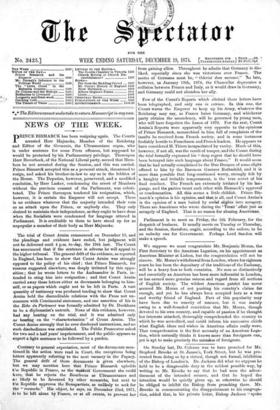The trial of Count Arnim commenced on December 13, and
the pleadings and evidence have ended, but judgment will not be delivered until 4 p.m. to-clq, the 19th inst. The Count has announced that if the sentence is adverse he will appeal to the higher tribunal. The general drift of the evidence, as reported in England, has been to show that Count Arnim was strongly opposed to the policy of his chief ; that Prince Bismarck, for reasons suggested elsewhere, was deeply irritated by this oppo- sition ; that he wrote letters to the Ambassador in Paris, in- tended to sting him into resignation ; and that Count Arnim carried away these letters either as documents belonging to him- self, or as papers which ought not to be left in Paris. A vast quantity of testimony was produced tending to show that Count Arnim held the discreditable relations with the Press not un- common with Continental statesmen, and one assertion of his in the Echo du Parlement was formally admitted by Dr. Bockhorn to be a diplomatist's untruth. None of this evidence, however, had any bearing on the trial, and it was admitted only as bearing on the " characterisation " of Count Arnim. The Count denies strongly that he ever disobeyed instructions, and no such disobedience was established. The Public Prosecutor asked for two and a half years' imprisonment, and the public appears to expect a light sentence to be followed by a pardon.






































